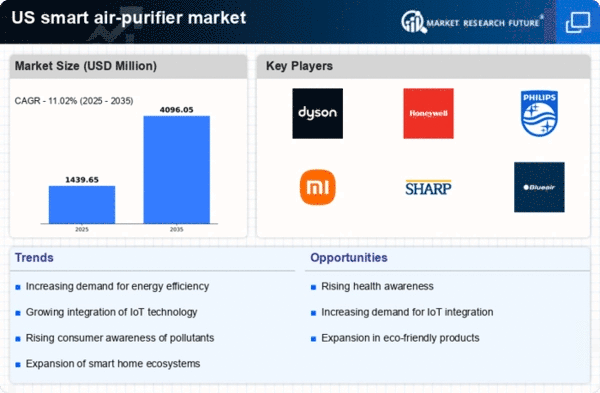Rising Air Quality Concerns
The increasing awareness of air quality issues in urban areas drives demand for the smart air-purifier market. With studies indicating that indoor air can be 2-5 times more polluted than outdoor air, consumers are becoming more vigilant about the air they breathe. This concern is particularly pronounced in densely populated cities where pollution levels are high. As a result, the market for smart air purifiers is projected to grow, with estimates suggesting a CAGR of around 10% over the next few years. The smart air-purifier market is responding to this demand by offering advanced filtration technologies that can effectively remove pollutants, allergens, and harmful particles from indoor air.
Increased Consumer Spending on Home Comfort
As disposable incomes rise, consumers are increasingly willing to invest in home comfort products, including smart air purifiers. The trend towards creating healthier living environments is becoming a priority for many households. Reports indicate that the average household expenditure on home appliances has increased by approximately 15% in recent years. This shift in consumer behavior is likely to bolster the smart air-purifier market, as individuals seek products that enhance their quality of life. The smart air-purifier market is capitalizing on this trend by offering a range of products that combine functionality with aesthetic appeal, catering to the modern consumer's preferences.
Regulatory Support for Air Quality Improvement
Government regulations aimed at improving air quality are influencing the smart air-purifier market. Initiatives to reduce air pollution and promote healthier indoor environments are becoming more prevalent. For example, the Environmental Protection Agency (EPA) has established guidelines for indoor air quality, encouraging the adoption of air purification technologies. This regulatory support is likely to drive growth in the smart air-purifier market, as consumers seek compliant products that meet these standards. The smart air-purifier market is poised to benefit from these regulations, as manufacturers develop solutions that align with government initiatives, thereby enhancing their market presence.
Technological Advancements in Air Purification
Innovations in air purification technology are significantly impacting the smart air-purifier market. The integration of IoT and AI capabilities allows for real-time monitoring and control of air quality, enhancing user experience. For instance, smart air purifiers can now connect to mobile applications, providing users with data on air quality levels and filter status. This technological evolution is likely to attract tech-savvy consumers, thereby expanding the market. The smart air-purifier market is witnessing a surge in products equipped with HEPA filters and UV-C light technology, which are proven to eliminate up to 99.97% of airborne particles, further solidifying their appeal.
Growing Awareness of Allergies and Respiratory Issues
The rising prevalence of allergies and respiratory conditions is a key driver for the smart air-purifier market. With an estimated 50 million Americans suffering from allergies, there is a heightened demand for products that can alleviate symptoms. Smart air purifiers equipped with advanced filtration systems are increasingly recognized for their ability to capture allergens and improve indoor air quality. This awareness is likely to propel the market forward, as consumers actively seek solutions to mitigate health issues related to poor air quality. The smart air-purifier market is responding by developing specialized products that target specific allergens, thereby addressing consumer needs more effectively.
















